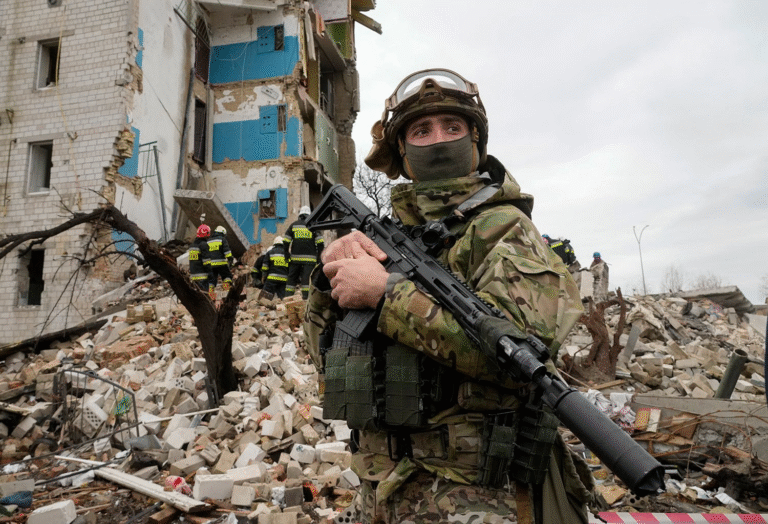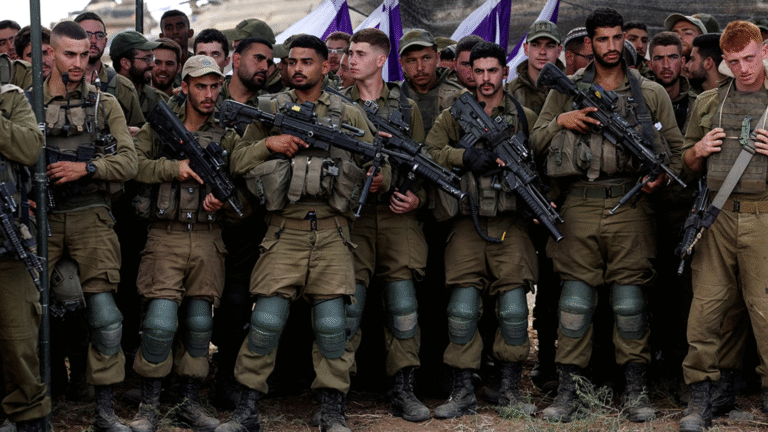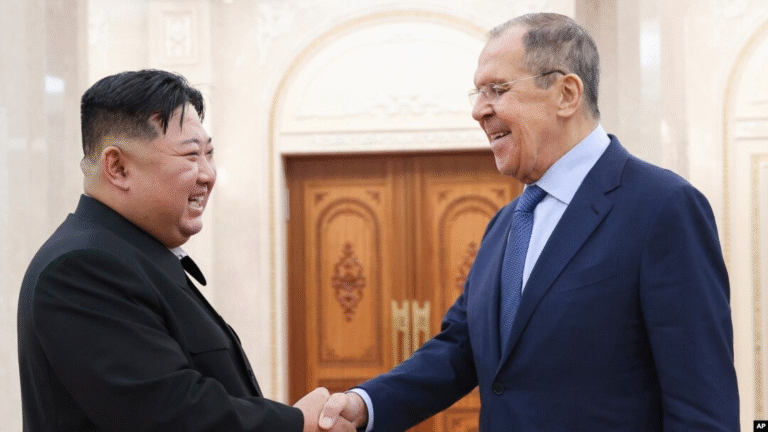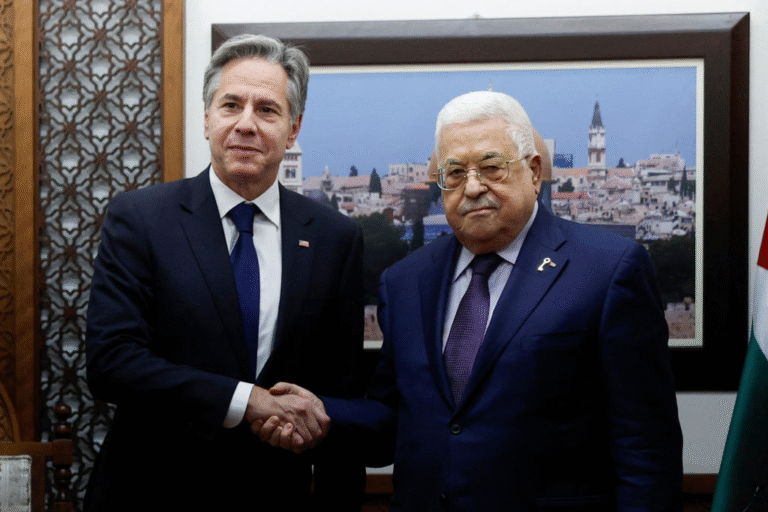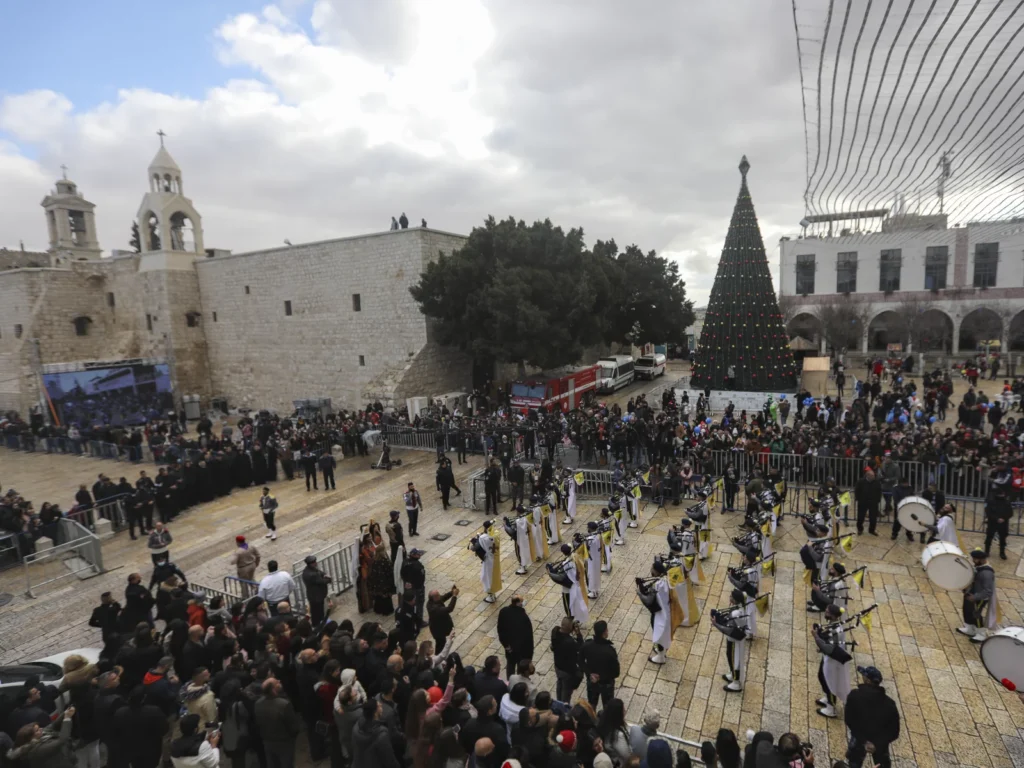
Christmas tree in Bethlehem in 2021. Photo credit: NPR
Nicholas Tocco
The America-Eurasia Center
The Middle East Program
www.EurasiaCenter.org
The America-Eurasia Business Coalition
www.usebc.org
Christmas is often a time of joy and celebration; a time of feeling warmth and comfort as
one is together with their family and closest friends. However, for the Christians of Palestine, the
holiday season has been canceled as they are feeling grief and fear in light of the ongoing war
between Israel and Hamas, with its Christian leaders wishing to express solidarity with the plight of
their Muslim counterparts. These emotions are actually a continuation of the frustration that has
been felt by the Christians of Palestine for many decades.
Palestinian Christians are often called the ‘living stones’ of Christianity as they can trace
their history to the birth of the Church in this land 2,000 years ago.”1 Palestinian Christians make
up 2% of the overall Palestinian population in the West Bank and less than 1% of the population in
Gaza.2 These Christians are indigenous to the Holy Land and represent the oldest Christian
community on earth. In spite of this, many Christians around the world are unaware of the
existence of Christians in Palestine and still view the conflict as a religious war between Muslims and Jews. “The majority are members of Orthodox churches, second most are Roman Catholic, and
then Anglican, Lutheran, and other denominations. They enjoy a respected place in Palestinian
society, and a status in government, culture and business that belies their tiny percentage of the
population.”3 Palestinian Christians strongly identify with the same Palestinian culture as their
Muslim counterparts. In fact, Muslims and Christians have lived together in peace for many
generations. Today, they both are forced to endure the humiliation of Israeli occupation.
“One of the most painful restrictions of the occupation are the limits on their freedom to worship. Tourists
from around the world can visit the Church of the Holy Sepulcher in Jerusalem, believed to be the
site of Jesus’ burial tomb, yet Palestinian Christians who live only a few miles away cannot reach it
without a special permit that they can rarely obtain, even during the Easter season.”4
One of the most recent prominent events in the history of Palestinian Christians is the
Kairos Palestine Document, which was signed by thousands of Palestinian Christians and supported
by all the Heads and Patriarchs of the Jerusalem Churches. The Kairos Palestine Document
declares that God does not love one group of people more than another but loves everyone equally.
The document discusses the plight of the Christian population as it is declining, despite residing in
the place where Christianity was born. The document also condemns Christian Zionism as it poses
a threat to the safety of Palestinian Christians and deems the Israeli occupation as a sin against God.
“‘We declare that any theology, seemingly based on the Bible or on faith or on history, that
legitimizes the occupation, is far from Christian teachings, because it calls for violence and holy
war in the name of God Almighty, subordinating God to temporary human interests, and distorting
the divine image in the human beings living under both political and theological justice.’”5 The
Kairos Palestine Document also rejects any claims made by Israel that Palestinian Muslims are the
reason that Palestinian Christians choose to leave Palestine, instead stating that it is because of the
occupation.6
The most recent conflict between Israel and Palestine has now marked yet another phase in
the history of the Christians of Palestine. On November 22, leaders of the Palestinian Christian
community in the West Bank city of Bethlehem, declared that all Christmas festivities are to be
canceled as an act of solidarity with the plight of the fellow Palestinians in Gaza. “There will be no
public celebrations, no twinkling Christmas lights and no decorated tree in Manger Square-not as
long, they say, as a state of war reigns over the embattled Gaza Strip, and the majority of its
residents cope with Israeli bombardments, the devastation of their homes and a spiraling
The most recent conflict between Israel and Palestine has now marked yet another phase in
the history of the Christians of Palestine. On November 22, leaders of the Palestinian Christian
community in the West Bank city of Bethlehem, declared that all Christmas festivities are to be
canceled as an act of solidarity with the plight of the fellow Palestinians in Gaza. “There will be no
public celebrations, no twinkling Christmas lights and no decorated tree in Manger Square-not as
long, they say, as a state of war reigns over the embattled Gaza Strip, and the majority of its
residents cope with Israeli bombardments, the devastation of their homes and a spiraling humanitarian crisis.”7 Hanna Hananiyah, the Mayor, canceled Christmas celebrations in favor of
demonstrations in solidarity with Gaza. “Bethlehem yearly hosts the main Christmas celebrations,
including the traditional bishop’s entry to the Nativity Church, which is accompanied by scout
bands parades and popular celebrations.”8 In Ramallah, the lighting of the Christmas tree, one of
the most attended holiday events in Palestine, is canceled. These acts are not to be taken lightly, as
for the Palestinian Christian community, who are predominantly located in Ramallah and the West
Bank. For the Palestinian Christian community, which is primarily located in Bethlehem and
Ramallah, Christmas is the most important event to celebrate their heritage. The cancellation of
these celebrations is a means of displaying the mourning and suffering all Palestinians, regardless
of faith, have been feeling since the beginning of the war.
There are also many Palestinians, such as Hid Shraideh, who wish to do much more than
pray and boycott Christmas and take actions such as raising aid for the people of Gaza, but this is
not possible, which many feel is a violation of their right to practice their Christian faith.9 The
pastor of Bethlehem’s Evangelical Lutheran Christmas Church, Munther Isaac, has described the
ongoing conflict as a genocide that has resulted in the displacement of nearly two million people.
For Christians in Gaza, they are facing a possible extinction event as there are roughly less than
1,000 Christians in Gaza, with Israeli airstrikes having damaged or destroyed all of the homes of
the Christian community in Gaza City, including the oldest active church in Gaza.10 This church,
the Orthodox Saint Porphyrius, is also one of the oldest churches in the world and was targeted in a
bombing that killed 18 Palestinians that had been seeking refuge there.11 According to Isaac, the
Christian community in Gaza is overwhelmingly homeless. As a result of this, up to 20% of the
Christian population in Gaza fled for other parts of the world as they had foreign passports. “Jack
Sara, president of Bethlehem Bible College, pointed to how the plight of Palestinian Christians
doesn’t seem to be heard by many U.S. evangelicals, who see in muscular Jewish supremacy over
the Holy Land a pathway for their own messianic vision.”12
In response to all of these tragic events, on the week of November 29th, Isaac was a part of
a delegation of Palestinian Christians to persuade the Biden administration, religious leaders, and lawmakers in endorsing a total ceasefire. A letter was sent to President Biden, signed by Isaac and
his Catholic, Armenian, and Orthodox counterparts from Bethlehem. The letter asks that politicians
serve as instruments of God’s and that their Christmas wish is for the death and destruction to come
to a permanent end.13 “The delegation’s members condemned Hamas’s and deplored its killing of
innocent civilians and abduction of hostages. But they questioned Israel’s declared intention to
wipe out an organization that is part of the fabric of Palestinian society and seen as a standard-
bearer of resistance to decades of Israeli military occupation and domination.”14 During this trip to
D.C., Munther Isaac and Tamar Haddad, another member of the delegation, did an interview with
NPR. During this interview, Isaac stated that it is a scathing indictment of the United States
Government to espouse religious freedom while doing nothing to aid in the plight of Palestinian
Christians.
Isaac further explained that the Christian Right in the U.S. cares very little for Christians
living in the Middle East except for when they are being persecuted by Muslim extremists, but do
nothing if they are being persecuted by Jewish extremists.15 This can be seen in how several
Republican lawmakers have been motivated by the ideology of Christian Zionism, in spite of the
fact that Palestinian Christians in the West Bank and Jerusalem feel threatened by the actions of
Jewish extremists that are passively aided by their far-right government.16 Haddad described his
own experience as a Palestinian Christian in Jerusalem following the outbreak of war, having
practically locked himself in his house for a month for fear of being attacked by Israeli settlers.
When asked about how the main counterargument to a ceasefire is the fear that Hamas would
conduct another attack, Isaac responded with his belief that he accuses Israel of committing
genocide because their leaders have stated their intentions to conduct genocide. He feels that
Israel’s actions go far beyond attempting to eradicate Hamas. Isaac has stated that they have made
no efforts to reach out to Hamas due to a lack of direct access but also because of his belief that
Hamas ability to gain so much more power is the result of Israel’s desire to weaken the Palestinian
Authority and keep Palestinians divided. Isaac hoped that his meetings with lawmakers would
make them understand that while all of their focus was on Gaza, it was important to remember the
raids, checkpoints, mass arrests, and settler violence in the West Bank. Christmas is canceled in
Bethlehem yet the larger question to ask is who remains in Gaza to create a future where the wolf
will dwell with the lamb, and the leopard will lie down with the young goat, and the calf and the young lion and the fatling together; and a little boy will lead them. Isaiah 11:6 Will the cycle of
violence and retribution ever end? This is the question for the peoples and leaders to ask
themselves.
Works Cited
1. “Palestinian Christians,” Palestine Portal, January 20, 2018, https://www.palestineportal.org/learn-
teach/israelpalestine-the-basics/palestinian-christians/.
2. Ishaan Tharoor , “Why Christmas Is Canceled in Bethlehem,” The Washington Post , November 29, 2023,
https://www.washingtonpost.com/world/2023/11/29/palestinian-christians-christmas-ceasefire-cancel/.
3. “Palestinian Christians,”
4. “Palestinian Christians,”
5. “Palestinian Christians,”
6. “Palestinian Christians,”
7. Tharoor, “Why Christmas Is Canceled in Bethlehem,”
8. Qassam Muaddi, “Palestinian Christians Cancel Christmas Celebrations to Mourn Gaza Victims,” The New Arab, November 23, 2023, https://www.newarab.com/news/palestinian-christians-cancel-christmas-plans-amid-gaza-war.
9. Muaddi, “Palestinian Christians Cancel Christmas Celebrations to Mourn Gaza Victims,”
10. Tharoor, “Why Christmas Is Canceled in Bethlehem,”
11. Muaddi, “Palestinian Christians Cancel Christmas Celebrations to Mourn Gaza Victims,”
12. Tharoor, “Why Christmas Is Canceled in Bethlehem,”
13. Tharoor, “Why Christmas Is Canceled in Bethlehem,”
14. Tharoor, “Why Christmas Is Canceled in Bethlehem,”
15. Asma Khalid, “Bethlehem, in the Occupied West Bank, Will Skip Christmas Festivities This Year,” NPR, December
2, 2023, https://www.npr.org/2023/12/02/1216716034/bethlehem-in-the-occupied-west-bank-will-skip-
christmas-festivities-this-year.
16. Tharoor, “Why Christmas Is Canceled in Bethlehem,”


